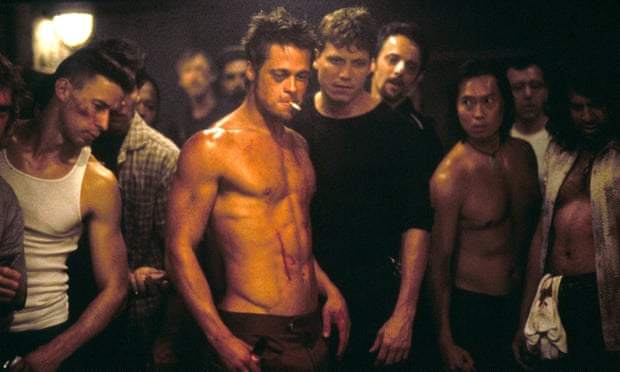A new version of the movie available to Chinese audiences transforms the anarchist message of the original
At the end of David Fincher’s 1999 cult classic Fight Club, Edward Norton’s character the narrator kills off his imaginary alter ego Tyler Durden – played by Brad Pitt – and then watches as multiple buildings explode.
The imagery cuts to the heart of the film’s message: a plan to bring down modern civilisation is under way.
Over 20 years on, this anarchist and anti-capitalist message has been given a new makeover – with Chinese characteristics.
In the version newly available on streaming platform Tencent Video, the narrator still kills off Durden, but the exploding building scene is replaced with a black screen and a coda: “The police rapidly figured out the whole plan and arrested all criminals, successfully preventing the bomb from exploding.”
It adds that Tyler – a figment of the narrator’s imagination – was sent to a “lunatic asylum” for psychological treatment and was later discharged.
The change was noticed over the weekend by fans in China, where the American film is now available through streaming platform Tencent Video. It immediately confused viewers who had seen the original version who took to the internet to complain about it.
“This is too outrageous,” one commented on Tencent Video. “Fight Club on Tencent Video tells us that they don’t just delete scenes, but add to the plot too,” one user complained on China’s social media platform, Weibo. “I’d rather see Tencent pull this film. What you are propagating here is not ‘positive energy’. What are you trying to achieve by changing the ending?” remarked another disappointed viewer on Douban.
It is not clear whether government censors had ordered the alternative ending or if the original movie’s producers made the changes on their own. Tencent did not comment on the matter.
Censorship is not a new practice in China, and cultural products are often used as tools to promote societal values. The extent of the content moderation – in particular when it comes to foreign imports – can sometimes be severe.
“The new Chinese version of Fight Club puts power back into the hands of the police and implies an ideal closure in line with the Chinese state discourse in which the symbiotic relationship between the police and the state is a given,” said Dr How Wee Ng, who teaches Chinese film and media at the University of Westminster.
“This treatment is commonplace in many Chinese television dramas and films which represent crime and violence,” he added. “Ironically, the force with which censorship is imposed stems from a Chinese historical fear of social instability and the presupposition of threat to the status quo.”
Campaigns to cultivate an ideal relationship between culture, the market and the population have been ongoing in China for a number of years. Last December, China’s president, Xi Jinping, urged Chinese artists to strengthen their cultural confidence and contribute to a “socialist cultural power”.
And on Tuesday, the Cyberspace Administration of China announced it was launching a month-long “clean” web campaign to create a “civilised and healthy” atmosphere online over the lunar new year holiday.
Such an effort has had a profound impact on how western producers and distributors behave in China’s gigantic consumer market over the years. Hollywood studios, for example, often release alternative cuts in the hopes of clearing Beijing’s censorship hurdles and gaining access to millions of Chinese viewers.
In 2019, multiple scenes in the film Bohemian Rhapsody referencing iconic musician Freddie Mercury’s sexuality – a pivotal part of his biography – were dropped in its China release.
Source : theguardian.com

No comments:
Post a Comment